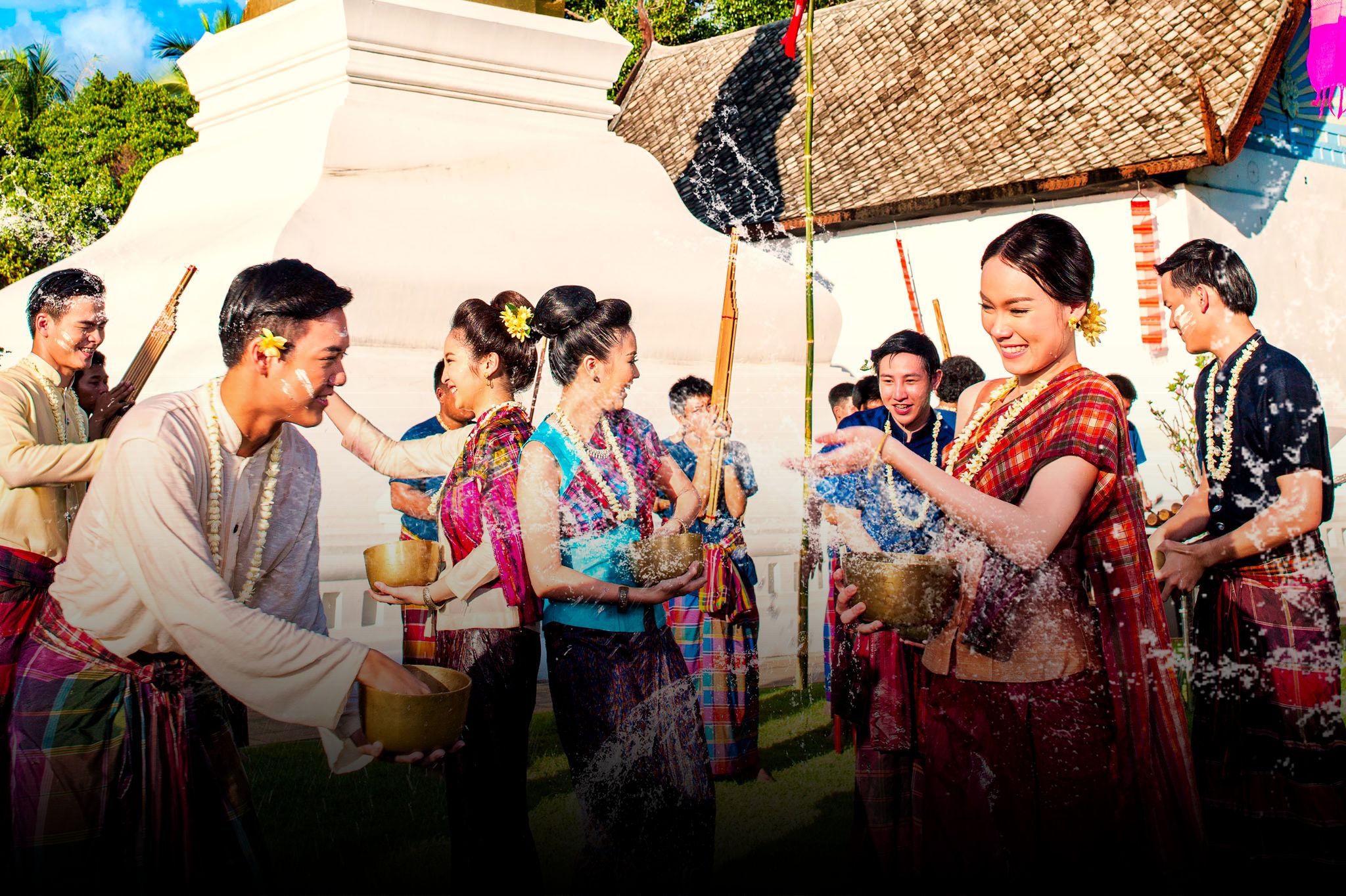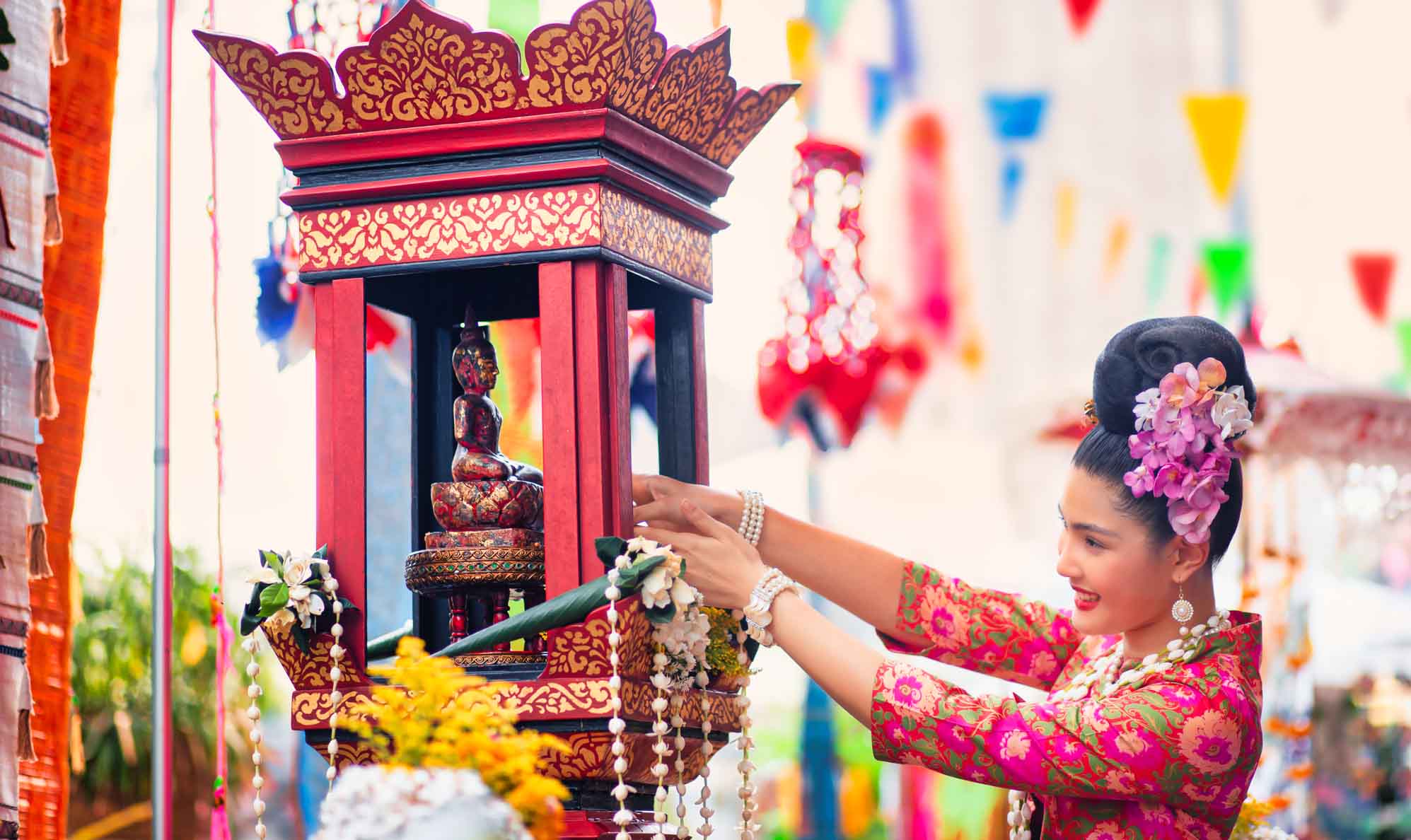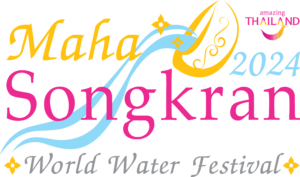
A Splash of Culture:
How Songkran World Water Festival is Preserving Traditions
The largest ever Thai New Year celebrations invite travelers to immerse themselves in an experience where stories of water-soaked revelry and cultural splendor never end.
Under the sweltering Bangkok sun, revelers of all ages dressed in vibrant floral shirts and armed with colorful water guns and buckets douse each other in a playful celebration of Songkran, the Thai New Year. Laughter and shrieks fill the air as icy water splashes across smiling faces, while the aroma of Thai street food mingles with the soaked festivities on Khaosan Road, the iconic epicenter for the nationwide water fight as part of the kingdom’s annual Songkran celebrations.
Later in the day, Buddha statues are paraded through the streets over which locals gently pour lustral water to pay respects and pray for prosperity. Amid the splashing water and joyous chaos, the scene beautifully captures the blend of tradition and fun that defines this traditional Thai New Year festival.

Celebrating Culture, Kinship, and Community
Inscribed in 2023 on the UNESCO Representative List of the Intangible Cultural Heritage of Humanity, Songkran marks the celestial event of the sun’s annual entry into the Aries constellation, thus heralding the start of the new year. The festival, Thailand’s biggest and most significant on the annual calendar, takes place in mid-April, following the rice harvest, when people across Thailand reunite with their families, reinforcing social bonds and reverence for elders in the community.
Water pouring plays a significant role in the festivities as a symbolic act of cleansing the old to welcome the new, particularly during the ceremony where young people prepare scented water to wash their parents’ or elders’ hands and ask for blessings, as well as the ritual where participants bathe important Buddha images. Impromptu water parties spring up on streets across the country—including legendary festivities along Khaosan and Silom roads in Bangkok that offer a once-in-a-lifetime experience—with revelers dancing to exuberant music and splashing water on passersby in a spirit of goodwill.
Traditionally celebrated for three days, from April 13 to 15, Songkran has historically marked a time of renewal and festivity across Thailand. To honor its recent UNESCO designation, the 2024 festival will be extended to three weeks, from April 1 to 21, uniting all 77 provinces in a celebration of unmatched scale.

A World-Class Festival
Over 500,000 international tourists are expected to converge in Bangkok for the Maha Songkran World Water Festival 2024 from April 11 to 15, joining locals and domestic travelers at the extravaganza at the heart of this year’s celebration. The festivities will take place in the historic area of Thailand’s bustling capital along Ratchadamnoen Klang Avenue and at Sanam Luang near the iconic Grand Palace and Temple of the Emerald Buddha.
The five-day event kicks off with the Maha Songkran Parade, featuring 20 grand processions and over 1,000 performers. The parade, a hallmark of Songkran celebrations, dazzles spectators with participants in traditional Thai costumes, alongside a range of cultural performances, including traditional Thai dances and music. Highlighting the parade are floats beautifully decorated with flowers, carrying representations of Lady Songkran—goddesses from a myth that tells the story of a deity and his seven daughters, one representing each day of the week.

At the main stage in Sanam Luang, attendees will be treated to a diverse line-up of cultural and musical performances, including the classical Khon masked dance drama and the Southern Thai Nora dance drama, both recognized by UNESCO as Intangible Cultural Heritage performing arts. The festival also offers contemporary music and orchestral performances, merit-making ceremonies, and workshops on local arts and crafts, as well as a designated water zone, complete with a musical dancing fountain, a gigantic wading pool, and water stations, promising a delightful and refreshing experience for all.
A Cultural Mosaic
While Songkran traditions from Thailand’s five regions will be showcased in a dedicated zone at the Maha Songkran World Water Festival 2024 in Bangkok, travelers with more time can also experience firsthand the festivities unique to each region.
For instance, in the northern city of Chiang Mai, once the capital of the ancient Lanna Kingdom, visitors have the opportunity to celebrate with locals by partaking in traditions reflective of the region’s identity. Amidst colorful parades and processions, revelers bring sand to temples—to return the sand they may have inadvertently carried away on the bottoms of their shoes over the year—and build sand pagodas decorated with colorful ceremonial flags, flowers, and sticks of incense.
Elsewhere in Thailand, local customs can be experienced in the village of Ban Sawathi in Khon Kaen Province. Here, at Wat Chaisri, an ancient temple more than 100 years old, trays made from banana leaves are filled with nail clippings, hair cuttings, fruit, and other items in different compartments to ward off bad luck and pray for prosperity in the New Year. Regional practices are also highlighted in Samut Prakan Province, just outside Bangkok, where revelers can partake in traditional pastimes like saba, a game similar to petanque and associated with the Mon people of Thailand.
From the rhythmic heartbeats of a ceremonial drum competition in Lampang’s lush northern landscapes to the atmospheric Brahmanic processions winding through Nakhon Si Thammarat in the south, Songkran showcases the diversity and unique cultural heritage of each region. Travelers can explore more distinct ways Songkran is celebrated across the kingdom on the Tourism Authority of Thailand website.
Just as Songkran melds the respect and honor for the past with the vibrancy of the present through its water rituals and celebrations, so too does Thailand’s tourism offer a seamless blend of ancient traditions and contemporary attractions. With lush jungles in the north, tranquil islands and beaches in the south, world-renowned cuisine, and a rich cultural heritage that spans ancient ruins and traditional festivals, countless unforgettable experiences await discovery in Thailand, where a traveler’s story never truly ends.





